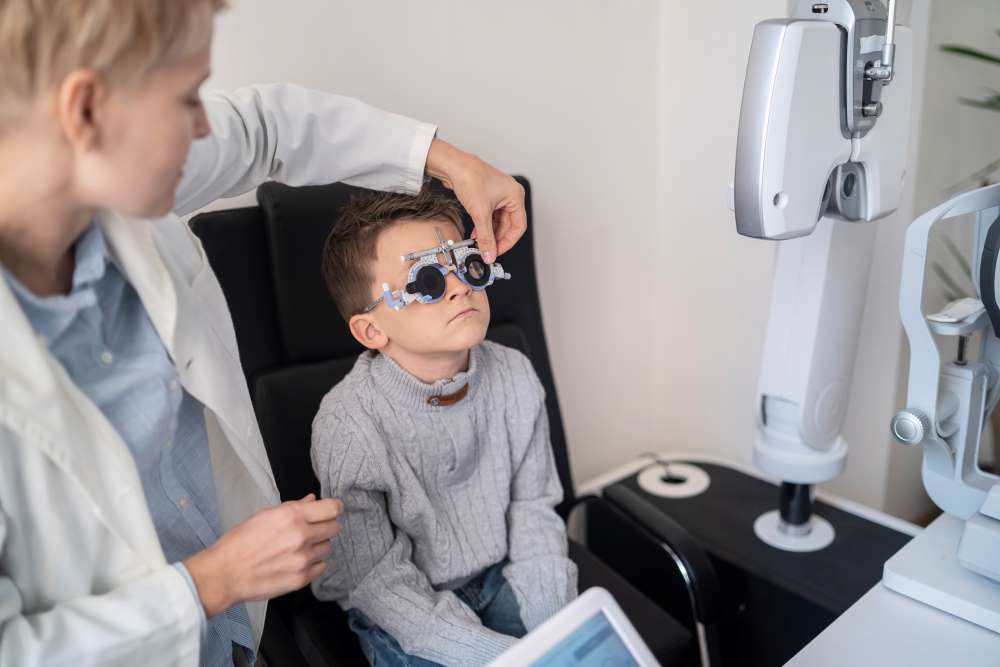
You may have noticed that your child squints when they read. Maybe they always sit close to the television or a teacher mentions that they struggle to read at school. Maybe your child unexpectedly failed the vision test at their regular annual checkup. Although it may come as a surprise, these are all signs that your kid needs glasses.
Many parents don’t realize their child needs help until their poor vision affects their life. If left uncorrected, visual impairment can negatively affect your child’s education and self-confidence. Thankfully, you can take several simple steps to correct your child’s eyesight. Here are six things to do if you suspect your child needs glasses.
-
Notice the Signs
Many kids don’t realize they need glasses because they’re used to seeing the world differently. For example, kids with poor eyesight may not realize that trees should have separate leaves or that grass is made of individual blades. Instead of telling you verbally, they’ll let you know they need glasses with their behavior.
For example, many children with eye problems will squint when they’re trying to see clearly. Some kids may complain of headaches and others may rub their eyes frequently or tilt their head to look at things. Children with poor vision may also put their faces very close to screens or books. If you notice these behaviors, it’s time to see an eye doctor.
-
See a Doctor
Prepare your child for their vision appointment by talking about it ahead of time. Discuss why you’re going and characterize the doctor as a friend who’s there to help. Let kids know what’s expected of them in the office and how long they’ll be there. You can encourage your child to see their vision test as a fun challenge instead of something stressful.
While you’re there, ask the doctor any questions you may have. Sometimes, doctors wait to see if a child’s eyesight will recover on its own. In certain circumstances, vision problems can be symptoms of eye disease. Your eye doctor will know how to appropriately diagnose and treat each vision issue.
-
Focus on the Fit
The doctor may decide that your child is ready for glasses. The most important thing in children’s glasses is finding a good fit. Children won’t want to wear glasses that pinch or slide off repeatedly. When glasses fit correctly, kids should be able to shake their heads and go about daily life without their glasses falling off.
A good fit will put your child’s eyes in the middle of the lens with plenty of room above the pupil. The long, straight part on glasses should go straight back and not extend too far behind the ears. The width of your child’s glasses should match the width of their face. Your child should try on both plastic glasses and metal pairs with adjustable nose pads.
-
Let Them Choose
There are many different colors and styles for kids’ glasses today. Get your child involved in the buying process and let them pick something they love. Glasses can really impact your child’s confidence, so letting them choose which pair to wear matters. Of course, you can guide your child and help them pick a style that suits their face shape.
If you can, get your kid two pairs of glasses. You won’t have to worry so much about them losing a pair and they can have multiple colors. Choose two different styles so kids can have fun switching them depending on how they feel and where they’re going. Although it may be tempting, don’t let your child buy a cute pair of glasses that don’t fit well.
-
Speak Positively
Unfortunately, glasses are often viewed negatively in American culture. Kids may tease your child about needing eye correction and many teen movies see glasses as a barrier to beauty. Your child may feel broken or inadequate because they can’t see on their own. They may misinterpret parental concern for their eyesight and worry they’re making you upset.
You can help your child see their glasses as a good thing by speaking positively. In the United States, 25.3% of kids under the age of 18 wore glasses in 2019. Help your child know that glasses are normal and even exciting by reading good books about kids with glasses. Be intentional about giving your kid positive messages before they pick up negative ones.
-
Release Guilt
Many parents feel guilty once they realize their child needs glasses. They wonder how they didn’t notice and feel awful that their child had a need they weren’t meeting. Other parents may worry that their child’s poor vision is their fault. However, even very healthy children can experience issues with their vision.
You know that you love your child and would do anything for them. Shaming yourself will not help your child correct their vision and it could impact their perception of themselves. Because feelings of guilt are common, it can really help to talk to other parents about their experiences. You can get on Facebook or join a local faith community to look for support.
The Gift of Sight
Good vision is incredibly important for your child’s future. Follow these six steps to care for your child’s vision and ensure they see the world in all its clarity. If you suspect that your child is having problems with their eyesight, take them to the doctor for a checkup. Depending on their age and state of vision, your doctor may decide they need glasses.
You can help your child find a pair that fits well and suits their personal style. Involve your kid in the purchase and speak positively about the experience. By the way you talk, you can teach your child that glasses are a gift instead of a burden. Finally, release any guilt you feel as a parent. With your support, your child will be delighted that they can finally see the world clearly.



























